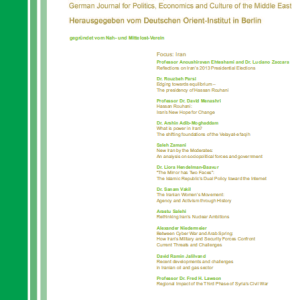Shop
Showing 33–48 of 331 resultsSorted by latest
-

Fighting and martyrdom in Islamic tradition and its use by modern jihadist groups
7,90 €incl. VAT
Add to basket -

The ‘Arab Spring’ in the Maghreb: Lessons and Prospects
7,90 €incl. VAT
Add to basket -

The Islamist parties in power: The Algerian experience
7,90 €incl. VAT
Add to basket -

Tunisian Salafism between institutional politics, dawa and jihadism
7,90 €incl. VAT
Add to basket -

Saudi Arabia: Women in an authoritarian state
7,90 €incl. VAT
Add to basket -

Orient III 2013 – Tranformation Processes in the Arab world
26,00 €incl. VAT
Add to basket -

Regional Impact of the Third Phase of Syria’s Civil War
7,90 €incl. VAT
Add to basket -

Rethinking Iran’s Nuclear Ambitions
7,90 €incl. VAT
Add to basket -

Between Cyber War and Arab Spring: How Iran’s Military and Security Forces Confront Current Threats and Challenges
7,90 €incl. VAT
Add to basket -

Recent developments and challenges in Iranian oil and gas sector
7,90 €incl. VAT
Add to basket -

The Iranian Women’s Movement: Agency and Activism through History
7,90 €incl. VAT
Add to basket -

New Iran by the Moderates: An analysis on sociopolitical forces and government
7,90 €incl. VAT
Add to basket -

“The Mirror has Two Faces”: The Islamic Republic’s Dual Policy toward the Internet
7,90 €incl. VAT
Add to basket -

What is power in Iran? The shifting foundations of the Velayat-e faqih
7,90 €incl. VAT
Add to basket -

Hassan Rouhani: Iran’s New Hope for Change
7,90 €incl. VAT
Add to basket -

Edging towards equilibrium – The presidency of Hassan Rouhani
7,90 €incl. VAT
Add to basket


